
Hey there, event planners and marketers! Are you constantly on the lookout for ways to make your events more successful? Pay close attention to this blog post because we're going to discuss the most important event KPIs (Key Performance Indicators) and why they're so crucial for your events.
As event professionals, getting caught up in the excitement and chaos of planning and executing an event is easy. At the end of the day, it's important to take a step back and assess how well your event performed. That's where event KPIs come in. These metrics allow you to track and measure the success of your event. Thus, giving you valuable insights into what worked and what didn't.
Why are KPIs so important for your event?
But why are event KPIs so important? Here are a few key reasons:
1. They Help You Set and Track Specific Goals for Your Event
Before you start planning your event, it's important to have a clear understanding of what you want to achieve. Are you looking to increase brand awareness? Generate leads? Drive sales? Whatever your goals may be, event KPIs allow you to track your progress toward achieving them. This can help you stay on track and make adjustments as needed to ensure your event is as successful as possible.
2. They Provide Valuable Insights for Future Events
Once your event is over, it's important to thoroughly examine the data and analyse how well it performed. This can give you valuable insights into what worked and what didn't, which can inform your planning for future events. For example, if you notice that a marketing tactic was particularly effective at driving attendance, you might consider incorporating it into your strategy for future events.
3. They Help You Demonstrate the Value of Your Event to Stakeholders
Whether you're reporting to your boss, your clients, or your investors, being able to show the value of your event is crucial. Event KPIs allow you to do just that by providing concrete data on things like attendance, engagement, and ROI. This can help you demonstrate the impact of your event and justify the resources invested in it.
4. They Can Help You Improve the Overall Experience for Your Attendees
By tracking key metrics like participant engagement and satisfaction, you can better understand what your attendees are looking for in an event. This can help you identify areas for improvement and make adjustments to ensure that your attendees have a positive experience at your events.
The 14 most important KPIs for your event
1. Event KPI: Number of registrations
One of the most obvious indicators, if you want to measure the success of an event, is the number of event registrations. Who has exactly registered? Who has not? Which industries are most interested in your event? It is best to evaluate this information in real time to be able to determine at what times (e.g. in connection with advertising measures) you received particularly large numbers of registrations for your event.
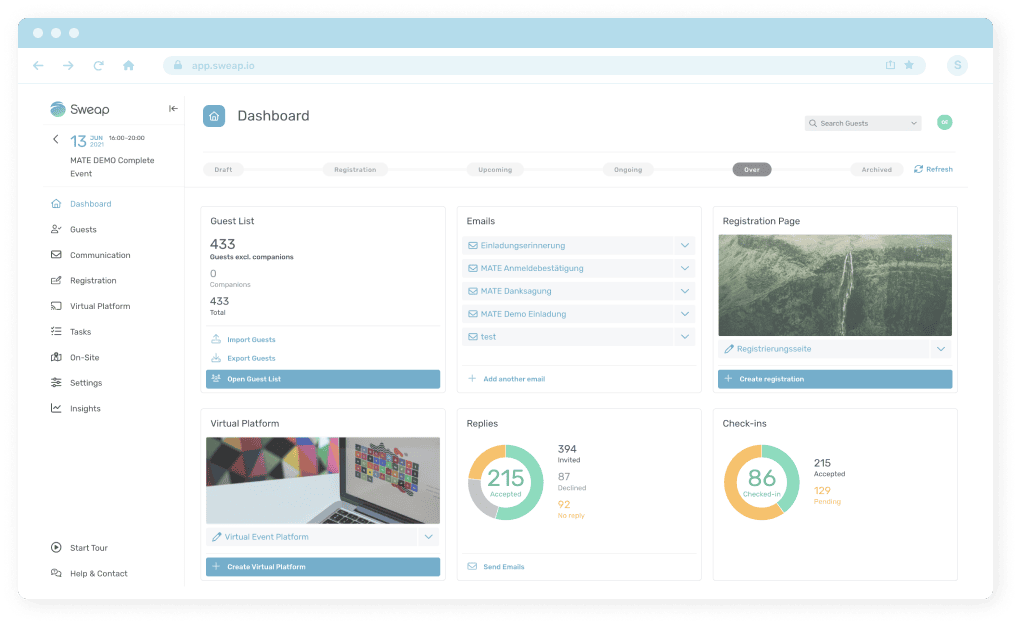
The Sweap Overview Dashboard shows the registrations
2. Event KPI: Participants on-site
A central indicator for the success of your event is the number of participants on-site, especially in relation to the number of previous registrations. What percentage of registered participants actually attended the event? If there is an unusual discrepancy in the event statistics, you should take a close look at the reason for this. This evaluation can provide important information about whether the content and topics you selected were able to arouse the interest of your target groups and whether the time and location were chosen appropriately.
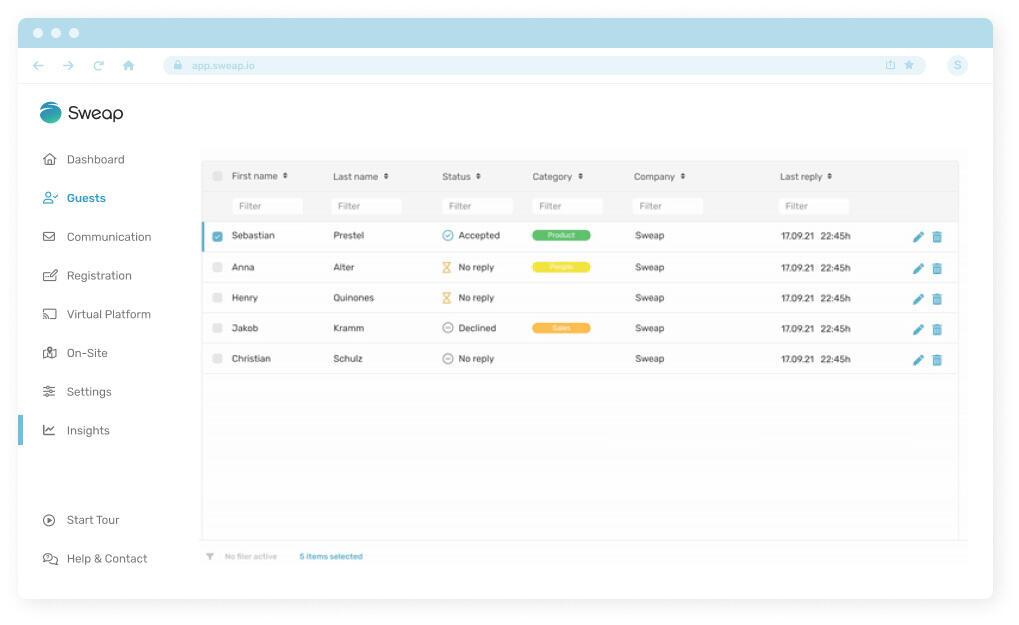
The Sweap guest list shows you who already has checked-in to your event.
3. Event KPI: New vs. returning participants
Take advantage of the data evaluation possibilities of a registration platform to take a closer look at your participants. The more recurring participants an event has, the more confident you as an Event Manager can be that your event concept will work. Depending on the type of event, it is usually normal for there to be a certain degree of fluctuation, but if participants do not come back for further events at all, this often indicates a problem.
4. Event KPI: Mentions and tagging in social media
With the help of an event hashtag selected and communicated in advance, you do not only get the opportunity to look at your event through the eyes of your participants in the social networks, but in the best case also receive free advertising for your company or event.
Who talks about you and your event and how? It can also be useful to identify and observe the additional hashtags that participants use to report on your event. Evaluate in which networks, how and by whom they are used.
5. Event KPI: Social Media Engagement
This KPI evaluates the direct reactions of users to your posts, tweets or contributions. So take a closer look at comments, shares, likes and the number of new subscribers. People mostly only share what they can identify with. The more often a post about your event is shared, liked or positively commented, the higher the so-called social media engagement is. This naturally has a positive effect on the awareness and image of your event and therefore your company or product.
By analysing these key figures, it is also possible to find out which content works well with your target group and which does not, so that you can adapt your online communication accordingly.
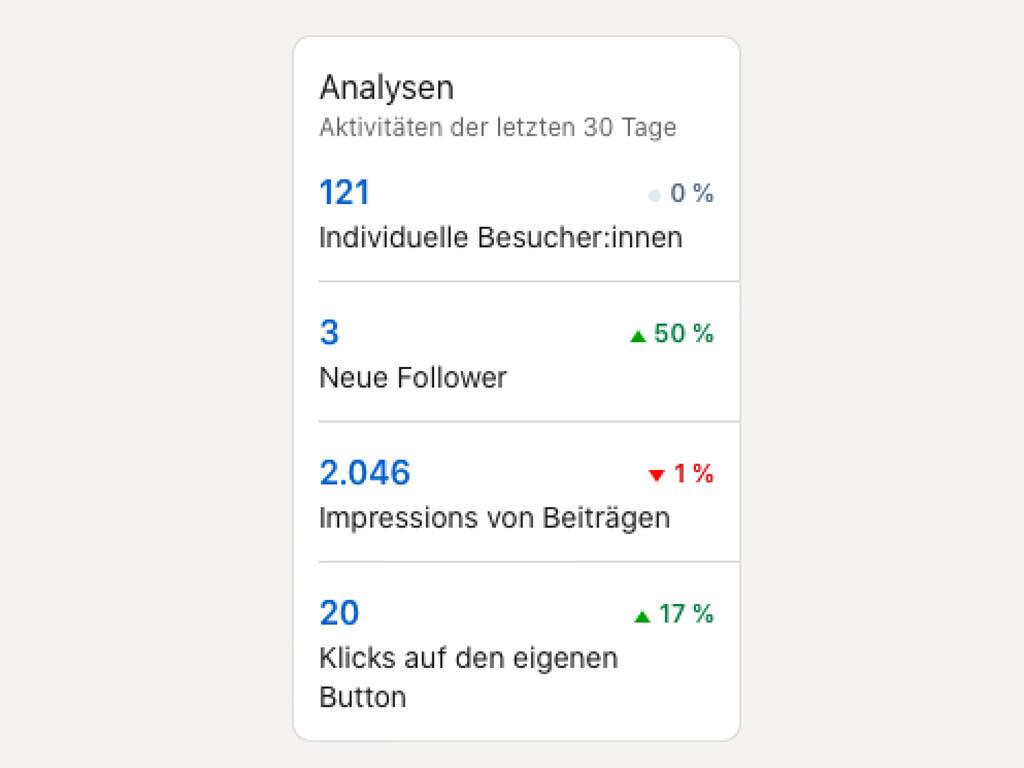
Statistiken helfen das Engagement deiner Social Media Kampagnen einzusehen.
6. Event KPI: Turnover
For events that are not free of charge, meaning your participants have to buy tickets for access, the turnover is an important KPI. From these figures you can see, among other things, what demand there is on the market for your event.
You should not only look at how much turnover has been generated by the event, but also filter out how the turnover is made up. For example, how successful were the different ticket categories? How well did early bird tickets sell compared to the regular price? How much turnover was generated by which target group?
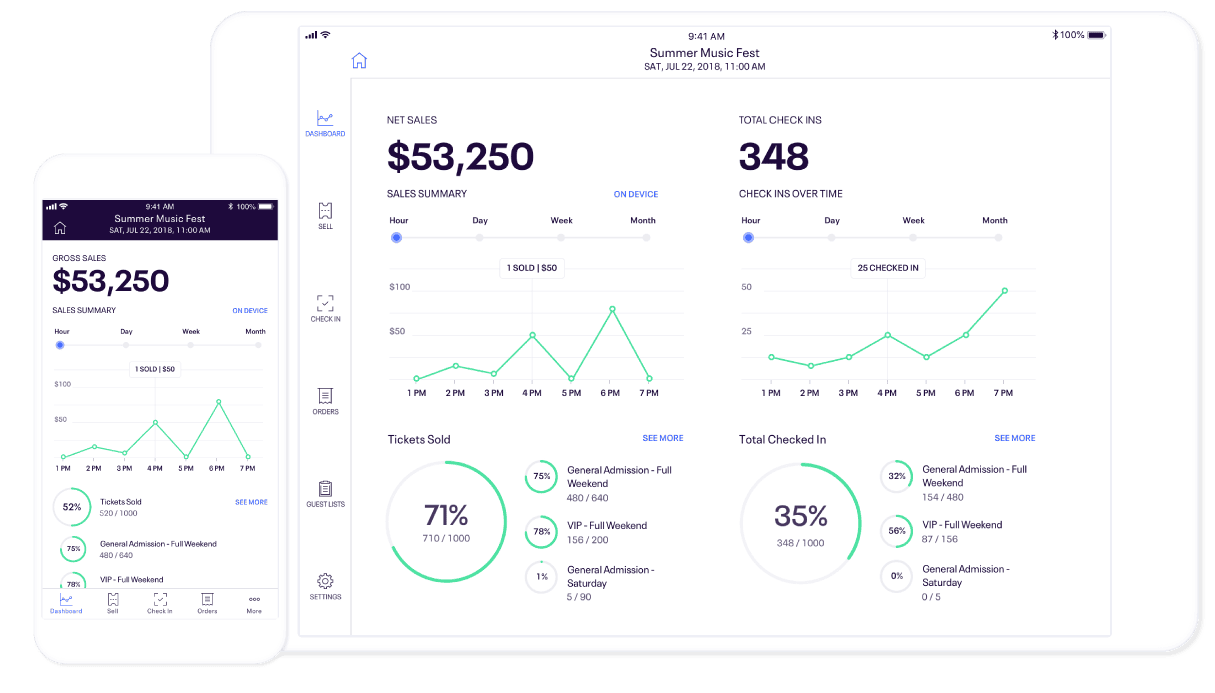
Ticket Sales in the ticketing dashboard Eventbrite.
7. Event KPI: Profit
In addition to the sales figures, the actual profit after deduction of all costs is of course also a relevant key figure for the success analysis of your event. Where have you exceeded your event budget? Where was ist not fully utilised? Where would higher investments have been worthwhile in retrospect? Is there still room for adaptions regarding your Return of Investment (ROI) - and have you fully used the possibilities?
The profit does not necessarily have to be viewed in purely monetary terms. For example, if your event was free of charge, you can offset the ideal value of your event against your expenses. How high were the costs per guest who attended the event,? What new contacts or orders did this generate for you? How high is their value? Does the success of your event allow for further events?
8. Event KPI: Interaction rates of your email marketing
Good event marketing is an important cornerstone for a great event - without it, you will find it difficult to achieve your goals for your event.
No matter whether it is about selling tickets or increasing the number of participants: An event marketing that fits the target group is essential! In the 21st century, e-mail marketing has become an integral part of your event marketing. Via email you communicate with newsletter subscribers and (potential) participants, send out invitations, reminders and feedback surveys.
So the key figures you should look at for this KPI are mail opening rates or the number of clicks to your registration page together with the registration form. Only half of your emails are opened at all or the link to your registration page is only clicked by every third recipient? Then you are either sending the mails to the wrong people or your topics and the way you communicate them are not interesting enough for your target group. Or you are not paying attention to the basics for the successful delivery of e-mails. You can also learn a lot from this analysis for future campaigns.
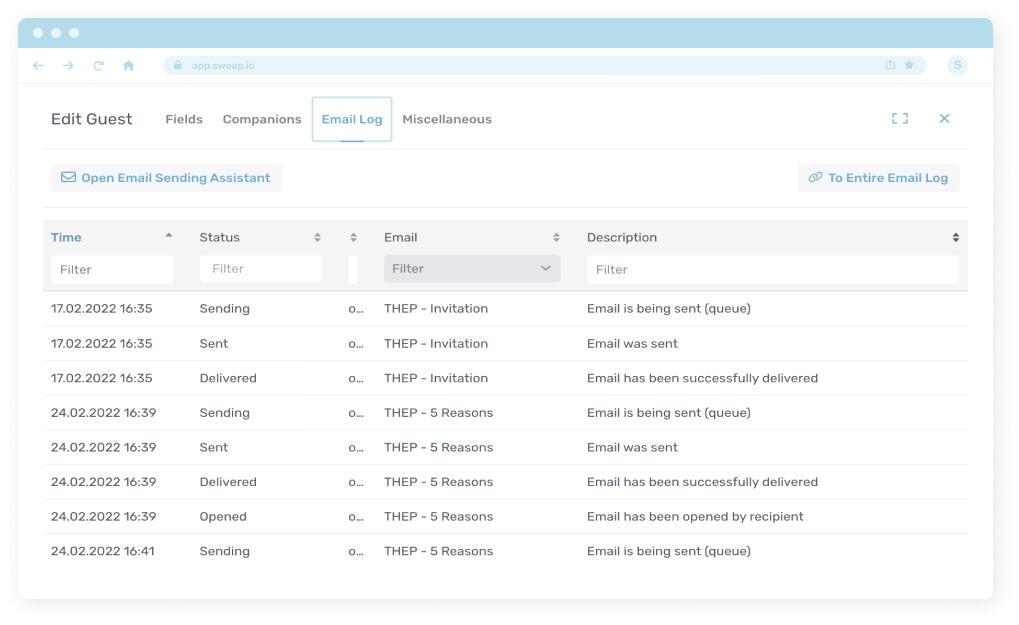
In the Sweap e-mail log you can see exactly who you have already contacted with which e-mail campaign.
9. Event KPI: Download numbers and usage analysis of your event app
Have you had an app programmed for your event? Then the information you can draw from it is another interesting KPI. Individual event apps do not necessarily entail higher costs. On the contrary, they can actually save costs because no programmes have to be printed.
Nevertheless, your participants will always have the important information at a glance in the app - and while with programme booklets you don't have any insight into how the participants use them, with the app you can see exactly which speakers, presentations etc. were clicked on particularly frequently in the run-up to or during the event. In this way, you can see exactly which topics and content are of particular interest to your participants and learn from them for the future.
10. Event KPI: Conversion rate of your website and shop or registration page
No matter whether it's a conference, festival, symposium, or movie premiere: Your website is usually an important contact point for (potential) participants. Here too, you can draw essential information from the evaluation of interaction and click rates. Which speakers are clicked on particularly frequently? What percentage of site visitors buy a ticket or register after watching the programme?
Pay particular attention to discrepancies: An over-average amount of people break off the purchase process in the middle of it or click on the link to the registration page in the invitation e-mail, but then do not register? Then you should run through the processes internally and see where users might get stuck or be put off.
11. Event KPI: Participant satisfaction
After the event is before the event! Make sure you use the opportunity to evaluate your event.
Ask your participants for feedback on the event in general, but also on specific programme items, speakers or content. You can also find out how satisfied your participants were with the organisation and communication around the event. KPIs from surveys can include satisfaction, the intention to come back or the likelihood of recommending the event to others.
12. Event KPI: Brand Awareness
Brand awareness is a KPI that measures the extent to which people are familiar with your brand. It's important to track brand awareness because it can significantly impact your business.
There are several benefits to increasing brand awareness, including:
Increased sales: When people are familiar with your brand, they are more likely to consider purchasing your products or services.
Greater customer loyalty: When people are familiar with your brand, they are more likely to become loyal customers.
Improved reputation: When people are familiar with your brand, they are more likely to positively perceive your company.
Increased competitive advantage: When people are familiar with your brand, you have a competitive advantage over other companies that are less well-known.
For these reasons, tracking brand awareness as a KPI for your events is important. By measuring how much your event increased your brand awareness, you can gauge the impact it had on your business and make adjustments as needed to improve your brand's visibility and reputation.
13. Event KPI: Website Traffic
Website traffic is a KPI that measures the number of visitors to your event website. It's an important metric to track because it can give you valuable insights into the effectiveness of your event marketing efforts and the overall interest in your event.
There are many ways to track website traffic, including through tools like Google Analytics. By tracking website traffic, you'll be able to see how many people are visiting your event website and where they're coming from (e.g., social media, email marketing, search engines). This can help you understand which marketing channels are most effective at driving traffic to your event website and make adjustments as needed.
Tracking website traffic can be particularly valuable in the context of an event because it can help you understand how much interest there is in your event and whether your marketing efforts are effective. By monitoring this event KPI, you'll be able to make informed decisions about your event marketing strategy and ensure that you're getting the most value out of your event website.
14. Lead Generation
Lead generation measures how many potential customers or clients you can generate at an event. This metric is important because it can provide valuable insights into your event's effectiveness in attracting and engaging potential customers.
There are many ways to generate event leads, including registration forms, lead capture kiosks, and business card collections. By tracking the number of leads you generate at your event, you'll be able to see how well your event is performing in terms of attracting potential customers and make adjustments as needed to increase your lead generation efforts.
In addition to tracking the total number of leads generated at your event, it can also be helpful to track the quality of those leads. For example, you might want to consider tracking metrics like the number of leads that converted into customers or the value of those leads in terms of revenue generated.
Choosing Event KPIs to Track
Now that you understand the importance of event KPIs, it's time to start thinking about which ones you should track for your events. This can be daunting, especially if you're unsure which metrics are most relevant to your goals and objectives.
To help you get started, here are a few key things to consider when choosing event KPIs to track:
Identify Your Event Goals and Objectives
Before you start tracking any KPIs, you must clearly understand what you want to achieve with your event. Are you looking to increase brand awareness? Generate leads? Drive sales? Whatever your goals may be, make sure you have a clear idea of what you're trying to accomplish before you start tracking metrics.
Consider the Stage of Your Event
Different stages of the event planning process will require different types of KPIs. For example, during the planning phase, you might want to track things like budget, vendor contracts, and timeline. During the execution phase, you might focus more on metrics like attendance, engagement, and satisfaction. And after the event, you'll want to track things like ROI and impact.
Think About Your Target Audience
Who are you trying to reach with your event? Different audience segments will have different needs and preferences, so it's important to consider this when choosing your KPIs. For example, metrics like lead generation and sales might be more important if you're targeting business professionals. If you're targeting consumers, metrics like brand awareness and social media engagement might be more relevant.
Consider the Resources You Have Available
Tracking KPIs can be time-consuming, so it's important to be selective about which ones you track. Make sure you choose metrics that are important and relevant to your goals, but also consider the resources you have available to track them. If you don't have the time or resources to track a particular KPI, it might not be worth the effort.
By following these tips, you'll be well on your way to choosing event marketing KPIs that are relevant, important, and achievable. Remember, the key is to be selective and focus on the metrics that will give you the most valuable insights into the success of your event.

A presentation of the the just mentioned points to make the KPIs measurable.
The Benefits of Monitoring Event KPIs
Here are just a few of the benefits you'll enjoy by keeping a close eye on your event KPIs:
1. Improved Event Planning and Execution With Event KPIs
By tracking key metrics during the planning and execution phases of your event, you'll be able to identify areas for improvement and make adjustments as needed. This can help you streamline your processes and ensure that your event runs smoothly and successfully.
2. Greater ROI
Tracking metrics like attendance, revenue, and cost allows you to calculate your event's ROI (return on investment) and determine whether it was worth the resources invested in it. This can help you make better decisions about how to allocate your resources in the future.
3. Enhanced Stakeholder Satisfaction
Whether you're reporting to your boss, your clients, or your investors, demonstrating your event's value is crucial. By tracking relevant KPIs, you'll be able to provide concrete data on things like attendance, engagement, and ROI. These can help you demonstrate the impact of your event and justify the resources invested in it.
4. Improved Participant Experience
Through engagement and satisfaction tracking, you'll be able to get a better understanding of what your attendees are looking for in an event. This can help you identify areas for improvement and make adjustments to ensure that your attendees have a positive experience at your events.
5. Better Decision-Making
By tracking relevant KPIs, you'll be able to make more informed decisions about your events. For example, if you notice that a particular marketing tactic is particularly effective at driving attendance, you might want to consider incorporating it into your strategy for future events. On the other hand, if a certain tactic isn't delivering the results you were hoping for, you might want to try something different.
6. Increased Efficiency
Tracking and analysing your event KPIs helps you identify areas where you can streamline your processes to save time and resources. This can help you plan and execute your events more efficiently. Thus, allowing you to get more value out of your events.
7. Greater Success With Event KPIs
Ultimately, the benefits of monitoring event KPIs come down to making your events more successful. By tracking the right metrics and using the insights you gain to inform your planning and execution, you'll be able to plan and execute events that deliver real value to your attendees and stakeholders.
What do KPIs say about your event?
KPIs are an important tool for event analysis to determine its success and to find out whether you have achieved the goals you set yourself in advance with your event. In order not to lose yourself in the multitude of measured values and key figures, it is important to identify, track and evaluate the KPIs that are most important for your individual event. In this article, we present the most important event KPIs, which will make not only the success analysis but also the subsequent optimisation possible. Various tools, e.g. Sweap, are available for the evaluation of the important Key Performance Indicators.
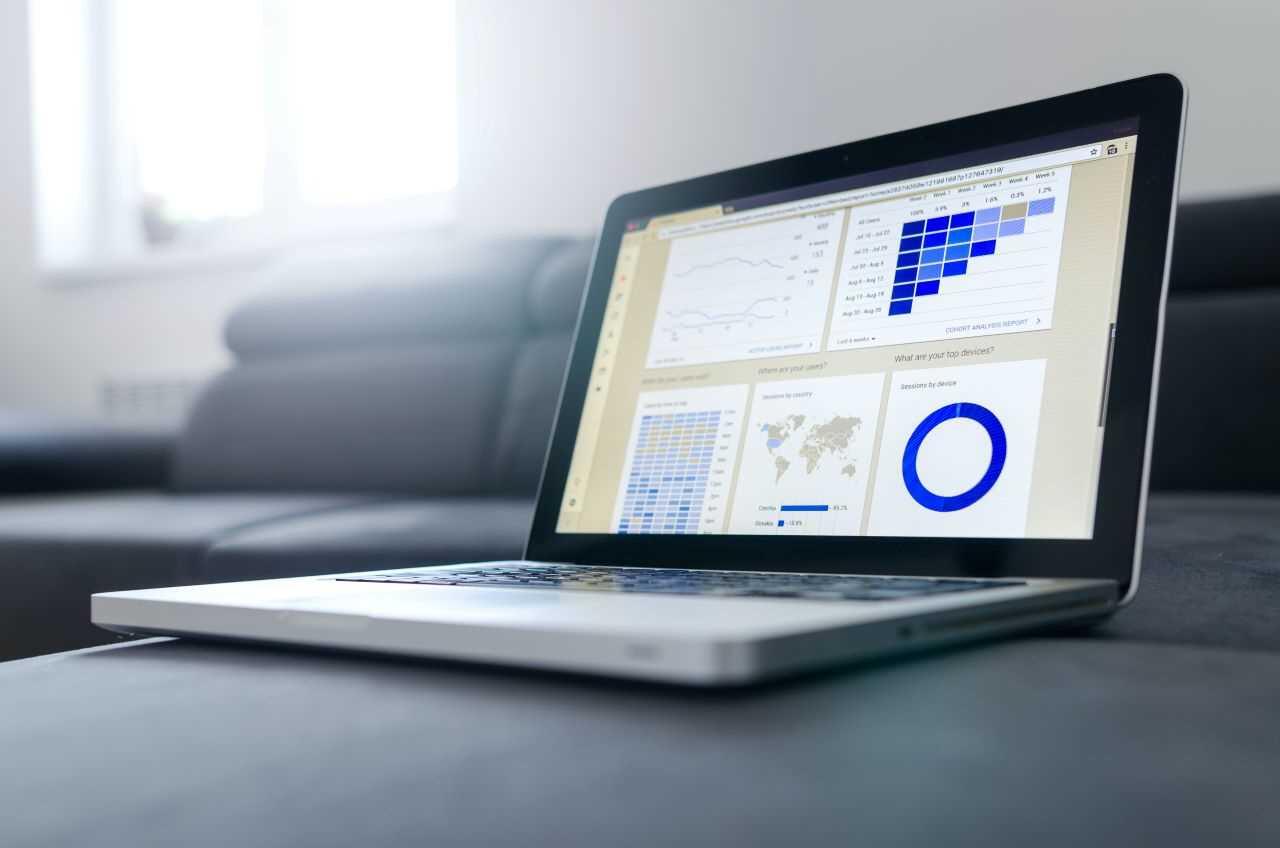
"Tracking" and the subsequent evaluation of the data is the basis for measuring the success of events.
Collecting the right event KPIs
The success of your event can be measured and optimised by collecting the right event KPIs. Which KPIs these are depends on the industry, the company, the type of your event and of course the defined objectives of the event. We will present the most important KPIs for the event industry in the following article so that you can see for yourself which ones are relevant in your case.
Conclusion:
This is how you get an overview of the success of your event
No matter whether it's about inspiring a certain target group with a new product, bringing trade visitors together at a conference, or thanking your own employees for their loyalty with an event: At the beginning of every successful event stand the goals you want to achieve with it.
KPIs support you in the success analysis. An overview of the various tools and key figures is everything! The easiest way is to use event management software such as Sweap, which offers various tools for measuring your event success and supports you in both the management and evaluation of your event. Whether invitation management, registration, guest list, or check-in: The corresponding data is automatically collected by the system and only needs to be read out and evaluated in order to benefit from the current figures in the future.
